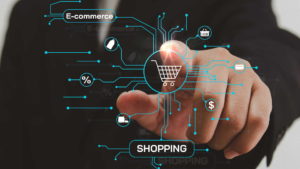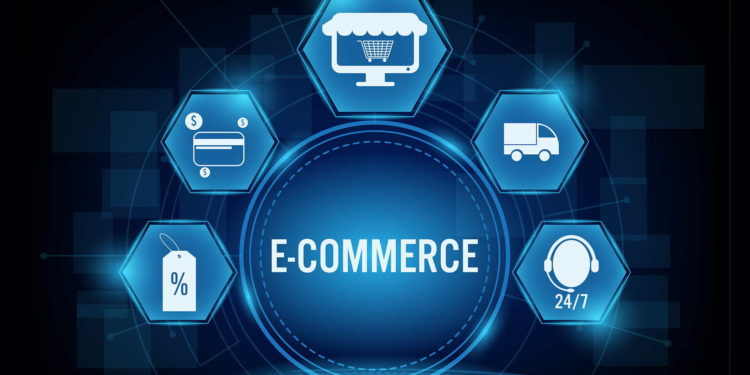Isn’t it wonderful that E-commerce technologies and digital advancements have made selling and buying a separate world on the internet? Well, yes because technology has made revolutions in several sectors and taken the business to the world of incredible experiences.
Nonetheless, Online purchasing and selling is very common in modern digital society. People now highly rely on e-commerce websites to buy the very desirable. However, have you ever given any thought to how e-commerce operates? How the big sites and platforms enable great user experience? Well, here is exactly the link between Technology and e-commerce to help with that.
Simply put, Digital tools and systems known as e-commerce technologies allow enterprises to accept online buying and selling. Stated differently, they are the unseen forces that drive your desired e-commerce sites. E-commerce technology comes together to offer a smooth online purchasing experience, from the website you explore to the checkout procedure.
Therefore, Let us explore the whole story of E-commerce technologies in more detail. When you do online shopping, it involves a long process. You search for stuff, you explore, and there are a lot of stuff you see, read reviews, and many more.
Now think about this, how this all pops out, why there are results in seconds and you see several things? This is where technologies in e-commerce work behind the scenes.
What Are E-Commerce Technologies?

E-commerce technologies are the devices, frameworks, and programs that make online purchasing and selling possible. Website platforms, payment processing systems, security procedures, data analytics tools, and customer relationship management (CRM) software are just a few examples of the different parts that make up these technologies. Electronic commerce technologies give businesses the functionality and infrastructure they need to successfully run and manage their online storefronts.
These technologies include many different parts, all of which are essential to the online buying experience. E-commerce technologies span all aspects of the transaction, from the platform that allows you to browse products to the secure payment system that safeguards your information.
Furthermore, the term e-commerce simply refers to internet purchasing. And E-commerce Technology is what allows it all to happen, though. Every stage of the process, from the websites you view to the method you make online payments, is powered by technology.
Here the issue goes beyond simply improving convenience when purchasing. The way we conduct business has fundamentally changed because of technology. You could even argue that the very existence of e-commerce is due to technology!
People first became aware in the early days of the internet that they could use this new technology to purchase and sell goods without ever having to leave their houses.
Technology still has a significant impact on e-commerce websites today. Furthermore, e-commerce has limitless possibilities because of recent developments in artificial intelligence and augmented reality.
The Role Of Technology In The Future Of E-Commerce Platform

The rapid advancement of technology is bringing about significant changes to the e-commerce market. Emerging technologies, including augmented reality and artificial intelligence, are completely changing the way we purchase and sell things online, and the future of e-commerce platforms looks to be even more innovative and transformative.
- To begin with, something that is causing wonders in the world is the development of artificial intelligence (AI).
It is one of the major themes influencing how e-commerce will develop in the future. Everything from chatbots for customer support to tailored product suggestions is being revolutionized by AI-powered tools and algorithms.
AI in e-commerce is the biggest addition. Artificial Intelligence (AI) can predict customer preferences, optimize processes, and improve the overall shopping experience by evaluating large volumes of data. We can anticipate that AI in e-commerce will become increasingly more important in the years to come, increasing customer satisfaction, efficiency, and customization.
- Then we can say the incorporation of virtual reality (VR) and augmented reality (AR) technologies into the e-commerce platforms and experience is another fascinating trend.
Before making a purchase, imagine being able to digitally try on clothing or see how furniture will look in your house. By enabling immersive, interactive experiences that blur the lines between the digital and real worlds, augmented reality and virtual reality have the potential to completely change online purchasing. These technologies will probably become standard aspects of e-commerce platforms as they get more complex and accessible, giving customers additional opportunities to interact and examine products.
- Besides, the way we shop online is changing due to developments in mobile technologies.
Mobile commerce, or m-commerce, is one of the influential E-commerce technologies and has become increasingly popular as a result of the widespread use of smartphones and tablets, enabling customers to shop whenever and wherever they choose. We can expect m-commerce to grow even more common as mobile devices get more powerful and internet speeds keep getting better. The mobile-first design will also become the standard for e-commerce websites and apps.

- Furthermore, advances in data privacy and cybersecurity are indistinguishably related to the future of e-commerce platforms.
It is more important than ever to protect sensitive customer information from cyber threats. To prevent data breaches and nurture customer trust, e-commerce companies must invest in strong security measures like encryption and multi-factor authentication.
The next is the safeguarding of personal data that companies or organizations obtain from individuals which is also known as data privacy in E-commerce technologies. Names, addresses, email addresses, and financial information are examples of this. Guidelines for the collection, use, and protection of data by organizations are established by data privacy regulations. Adherence to these legal statutes in e-commerce websites or platforms is vital in guaranteeing that enterprises manage personal information ethically and responsibly, safeguarding the confidentiality rights of their clientele.
- Moreover, E-commerce Technology Voice commerce, sometimes referred to as voice shopping, is a technology that lets users use virtual assistants like Google Assistant, Apple’s Siri, or Amazon’s Alexa to make purchases by speaking commands.
Users can speak their orders aloud to the virtual assistant, and it will conduct the transaction without the need for typing or clicking. Voice commerce is one of the incredible E-commerce technologies that make it easier to purchase hands-free and provides convenience for things like placing a new order, verifying the availability of a product, and creating a shopping list.
- Furthermore, Blockchain technology records and verifies transactions across several computers in a secure, decentralized manner.
Blockchain technology can be applied to e-commerce websites to trace the flow of goods from producer to customer, providing transparent and unchangeable records of transactions. Blockchain can also remove the need for middlemen like banks by enabling safe online payments with cryptocurrencies like Ethereum or Bitcoin. Additionally, by giving each item a verifiable record of authenticity, blockchain technology can help in the fight against counterfeit goods.

- Last but certainly not least, the term social commerce in E-commerce technologies describes the direct purchase and sale of goods and services via social media networks.
Businesses can display and sell things within the social media environment by using social commerce, as opposed to sending users to other websites to complete purchases. In e-commerce websites, Features like shoppable posts, which let users click on product tags to access more details and make purchases without leaving the platform, are examples of this. Social commerce makes use of the user base and interaction found on social networks to boost sales and brand awareness.
To cut a long story short, the future of e-commerce is an exciting place where innovation, technology, and consumer behavior come together. The possibilities are plentiful, ranging from immersive augmented reality experiences to AI-driven customization.
E-commerce websites and e-commerce platforms can prosper in an increasingly digital environment by adopting new technology and staying ahead of the curve, providing seamless and captivating shopping experiences to customers worldwide.
These technologies have transformed the whole shopping experience and facilitated it amazingly.
If you want to join the online business world, do learn about E-commerce technologies in e-commerce platforms.













